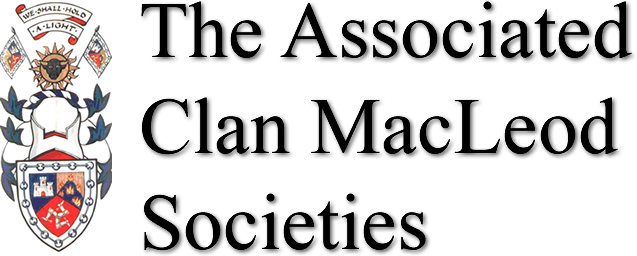Recommendations for DNA testing to explore your MacLeod ancestry

At the ACMS MacLeod DNA Surname Project hosted by Family Tree DNA (FTDNA), we focus primarily on interpreting and explaining the Y chromosome test results (Y-DNA) of men who have joined the project. Most of our project members bear the MacLeod surname or a variant thereof.
To a much lesser degree, we also help project members interpret their autosomal DNA (atDNA) test results that are often taken together with a Y-DNA test. Autosomal tests can help one find closer MacLeod relatives on your father’s or mother’s sides back to around 5 or 6 generations. On the other hand, the retrospective reach of Y-DNA tests is almost unlimited, and near matches to ancient DNA extracted from prehistoric burials emerge with each new discovery analysed.
And we have just started evaluating mitochondrial DNA (mtDNA) test results for women and men. However, given the uncertain links to MacLeod genealogy, we’ve made limited progress here.
This guide will help you choose the most appropriate DNA test depending on your interests and research goals.
Guidelines
If you are a genetic male* with a known or assumed paternal line consisting of MacLeods going far back in time, and you’re interested in learning more about your distant paternal-line MacLeod ancestry, we recommend one of the following Y-DNA tests:
A. If you want to know specifically where you are on the genetic tree of mankind, we recommend the Big Y test at FTDNA. This test will create links with other males who have similar or matching DNA characteristics, estimate how far back your common ancestor may have lived, and group you together with others on your part of the genetic tree. Currently, the Big Y test costs $US449 (on sale they can be as low as $US379). We have seen three main outcomes of these tests:
- About half of these tests show that the project member’s paternal line leads back to the presumed chiefly line of MacLeods, and ultimately to the founder of the clan. If so, with a Big Y test we can now also determine whether a project member’s ancestors were part of the Harris & Dunvegan branch or the Lewis & Raasay branch of MacLeods. As more MacLeods take Big Y tests, we are identifying more and more sub-branches of each main branch.
- Other times, the Big Y tests show that the member’s paternal line does not lead to this presumed chiefly line of MacLeods. In most of these cases, the member will find that he has close connections to one of 4 large, genetically distinct groups of MacLeods in the project. Ancestors of these MacLeods also came from Scotland and were part of the clan.
- Finally, there is also a chance that a member’s Big Y test will show a paternal line that does not lead to any of these 5 groups mentioned above. This can happen if, for example, there was an adoption somewhere in the member’s paternal line, or when testers descend from a hitherto unknown MacLeod branch.
B. If you are only interested in your high-level placement on the genetic tree of mankind, and whether you lie on the chiefly line of MacLeods, a Y-111 test will suffice. Unlike the Big Y test, Y-111 tests do not identify specific mutations on the Y chromosome that are now being used to define the structure of the MacLeod clan. Y-111 tests currently cost $US249; you can upgrade this test later to the Big Y level for $US229.
C. If you’ve already taken an older Y-DNA test, we recommend upgrading to the Big Y. A new cheek-swab DNA sample is not usually required.
*If you are a genetic female and are interested in learning about your paternal line’s ancestry, we recommend finding a close genetic male relative to test— for example a brother, father, uncle, or cousin.
If you are mostly interested in finding closer MacLeod relatives (e.g., 2nd- 4th cousins), we recommend taking an autosomal DNA test and linking these results to careful genealogical work. Whereas Y-DNA tests look at deep ancestry through analysis of the Y chromosome in men, an autosomal DNA test looks at the DNA from the remaining 22 chromosome pairs and allows women and men to match with close and distant relatives on both sides of the family going back 5 or 6 generations. These tests range in cost from $US50 – $US100 and are offered by companies such as FTDNA, Ancestry, and MyHeritage. Ancestry has the largest database of testers, and you’ll therefore find the largest number of ‘DNA relatives’ with an Ancestry DNA test. FTDNA allows you to upload Ancestry and MyHeritage results to their site.
Women and men might consider an mtFull Sequence DNA test if you think your distant maternal line leads to a MacLeod woman. MtDNA allows tracing back through the female line. They currently cost $US159.
The Clan MacLeod DNA Project page on FTDNA can be found here: https://www.familytreedna.com/groups/acms-mac-leod/about
A Connection to the Chiefly Line?
Finally, if you have already taken an autosomal DNA (atDNA) test, our MacLeod DNA Project Administrators have created a comparatively straightforward method for MacLeod men to determine if they are paternal-line descendants of the presumed chiefly line of MacLeods.
This describes how to search your raw autosomal DNA file for a specific Y chromosome mutation that is associated with MacLeods who descend from the presumed chiefly line of MacLeods and can be accessed here.
If you have tried following the step by step instructions but cannot make it work, our DNA administrators may be able to help.
Enjoy your DNA journey and be prepared for surprises!
Questions? Email one of your MacLeod DNA Project Admins:
